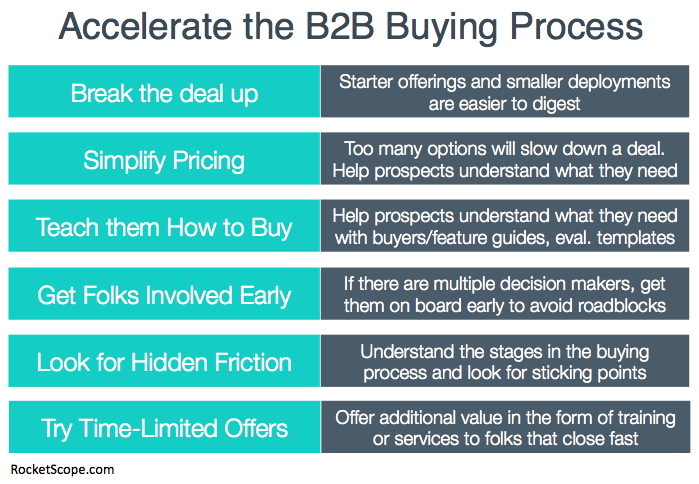I’ve spent my entire career working in or with startups that have sold to businesses. I love B2B. Businesses have burning problems and the money to solve them and I like revenue a lot. However, separating that money from those businesses is often difficult. The process a business goes through to make a decision about a $20K per year investment isn’t the same as the one you went through when you bought your last iPod. There are multiple people involved in making a decision, there are distinct stages in the buying process and hoops to jump through at every step. Closing a sale can take months and that can feel daunting for a startup that needs to drive some revenue fast.
But just because the process is complex doesn’t mean there aren’t things you could do to speed things up. Here are some ideas that I’ve used in the past that have worked for me.
- Break bigger deals into chunks – The bigger the purchase the longer it will take for companies to evaluate and make a decision. Breaking a deal into phases (selling the base functionality first and then add-on’s later, rolling out a department and then the whole company, etc.) can help move deals along and get revenue flowing faster.
- Simplify your pricing and packages – I’ve seen deals go slow simply because customers couldn’t decide which options they needed to buy. Having fewer options on the price list or making it obvious which options a particular kind of customer needs can make making a decision much, much easier.
- Teach prospects how to evaluate solutions like yours – Businesses that have never purchased a solution like yours before will spend some time researching what features are important and why, what offerings are on the market and which might be right for them. Once they have done that they will have to figure out how they will evaluate a solution in order to make a purchase decision. Teaching folks how to buy by publishing a buyer’s guide, publishing feature guides and comparisons, or creating evaluation templates can really help prospects move through the research and evaluation phases faster.
- Understand who the stakeholders are and get them involved earlier in the sales process – Many companies make the mistake of letting their internal company champion do all of the work to sell other stakeholders inside the company. Finding out who the other important decision makers are on deals and making sure they understand the value you provide can help you avoid roadblocks later in the sales process. For low-touch sales models this may mean creating content that is tailored to those personas and making sure it gets in front of them as early in the process as possible. Where sales reps are involved in an account this will require understanding the steps in the processes, the gatekeepers for the steps and figuring out how to get them engaged as early as possible.
- Understand the buying process and look for hidden friction points – I once sold B2B software where our deals were getting stuck with the purchasing group for weeks and was told “that’s just how long it takes, there is nothing you can do about that.” When I actually sat down with the folks in purchasing I discovered that they were spending time pulling competitive information from my competitor’s websites. When we supplied purchasing with a “competitor overview” with links to what they needed to know that sped the process up by almost 4 weeks.
- Offer a time-limited deal – Hey sometimes what works for toilet paper will work for your product too. In general I don’t like having sales or dropping the price on something (I think almost every B2B SaaS product I see right now is priced too low already) but I’ve seen companies throw in extras (customization help or training for example) for certain companies that they know are close but just need a little extra push across the finish line.



The link is broken 🙁
So sorry – here is the full post!